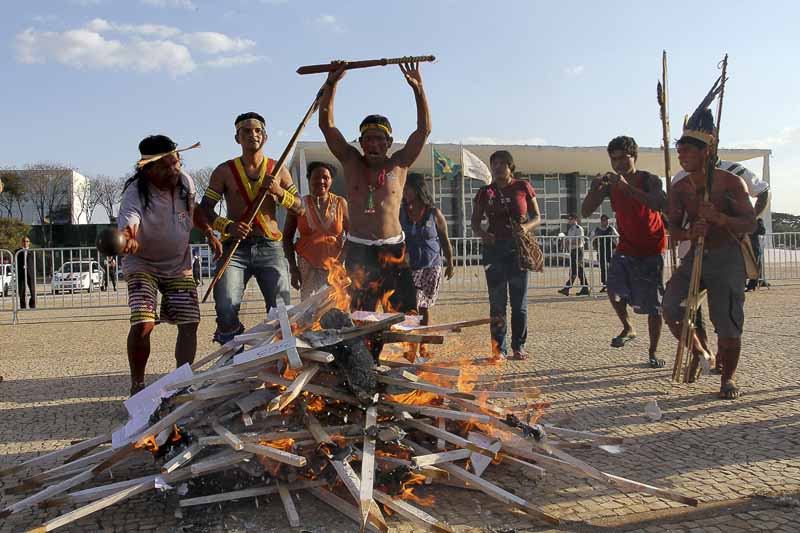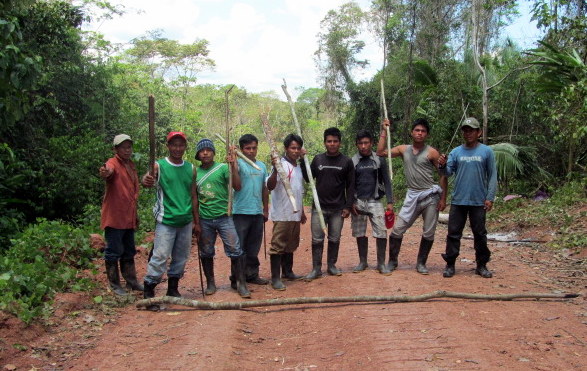
by Deep Green Resistance News Service | Oct 10, 2012 | Lobbying, Toxification
By Jeff Gray / The Globe and Mail
Chevron Corp. has lost a bid to have the U.S. Supreme Court consider its call for a worldwide ban on attempts to collect on a controversial $19-billion (U.S.) environmental judgment levelled against the company in Ecuador.
The decision comes with lawyers in Canada poised to battle in a Toronto courtroom next month over an attempt by the Ecuadorean plaintiffs to seize Chevron’s considerable Canadian assets to cover at least part of the massive judgment – a judgment the oil giant dismisses as fraudulent.
In the latest twist in a tangled legal saga, Chevron was trying to revive a preliminary injunction issued last year by a federal judge in New York. That injunction was later overturned on appeal. It purported to block the plaintiffs and their lawyers from trying to enforce the 2011 Ecuadorean court ruling not just in the U.S., but anywhere outside of Ecuador.
The U.S. Supreme Court refused on Tuesday to hear the case. It issued no reasons, as is customary, leaving the appeal court decision that quashed the injunction in place.
The news comes as lawyers for the plaintiffs – a group of villagers in the Amazon rainforest – have stepped up their campaign to force the oil company to pay for environmental damage from oil pollution in the Lago Agrio area of Ecudaor.
Chevron, based in San Ramon, Calif., has said it has virtually no assets remaining in Ecuador, and the plaintiffs have vowed to chase the company’s assets elsewhere. Their first stop, earlier this year, was Canada.
In May, they announced they had retained prominent Toronto lawyer Alan Lenczner, of Lenczner Slaght Royce Smith Griffin LLP, to try to have the judgment recognized by the Ontario Superior Court and force Chevron to fork over its Canadian assets, which include oil sands holdings. The plaintiffs have also filed a similar collection effort in Brazil.
In sprawling litigation in the United States, both sides have accused each of fraud and bribery in connection with the Ecuadorean ruling, allegations they both deny.
Chevron said Tuesday in an e-mailed statement that the company was disappointed with the decision but “will continue to defend against the plaintiffs’ lawyers’ attempts to enforce the fraudulent Ecuadorean judgment, and to further expose their misconduct in our pending [litigation] in New York and other proceedings.”
The plaintiffs’ say the ruling is the latest in a series of defeats for Chevron in U.S. courts.
“Chevron’s latest loss before the Supreme Court is an example of the company’s increasingly futile battle to avoid paying its legal obligations in Ecuador,” Aaron Marr Page, a lawyer for the Ecuadoreans, was quoted as saying in an e-mailed statement.
Read more from The Globe and Mail: http://www.theglobeandmail.com/report-on-business/industry-news/the-law-page/chevron-loses-bid-to-have-ecuador-case-heard-by-us-supreme-court/article4599707/

by Deep Green Resistance News Service | Oct 9, 2012 | Biodiversity & Habitat Destruction, Colonialism & Conquest, Indigenous Autonomy, Obstruction & Occupation
By Jeremy Hance / Mongabay
Construction on Brazil’s megadam, Belo Monte, has been halted again as around 150 demonstrators, most of them from nearby indigenous tribes, have occupied the main construction site at Pimental. Over a hundred indigenous people joined local fishermen who had been protesting the dam for 24 days straight. Indigenous people and local fishermen say the dam will devastate the Xingu River, upending their way of life.
“The renewed occupation of the project’s earthen cofferdams paralyzed construction works, while indigenous protestors seized the keys of trucks and tractors forcing workers to leave the strategic Pimental work camp on foot,” reads a press release from the NGO Amazon Watch. Around 900 workers were sent home.
This is the second occupation attempt in less than six months. Over the summer some 300 indigenous people sustained an occupation of the dam for 21 days, before breaking it off though little headway was made in talks with consortium building the dam, Norte Energia.
The Belo Monte dam, which would be the world’s third largest, has been plagued by controversy from its origin decades ago; the battle for the dam has been fought both in Brazil’s courts and on the international stage. If built, the dam will flood an estimated 40,000 hectares of present rainforest and could push some fish species to extinction. In addition, 16,000 people will be displaced according to the government, though some NGOs say the number is more likely double that.
Despite the impacts, the dam has been strongly supported by Brazilian President Dilma Rousseff, and every legal injunction against the dam has been overturned. Norte Energia has filed with a local court for repossession of the construction sties.
Indigenous groups say the construction of the dam is already imperiling their way of life, as the Xingu river becomes more difficult to navigate. They have also said they have no intention of leaving until Norte Energia meets their demands.
“We are witnessing the devastation of this land. The island of Pimental was completely destroyed, with a sole tree left standing, and the water is putrid. It is very shocking,” an protestor told Amazon Watch.
Dams are often described as ‘green’ energy source, however in the tropics they actually release significant methane emissions due to rotting vegetation. Although it has a shorter life than carbon, methane is a far more potent greenhouse gas.
From Mongabay: “Indigenous groups re-occupy Belo Monte dam in the Amazon“

by Deep Green Resistance News Service | Sep 10, 2012 | Indigenous Autonomy, Mining & Drilling, Obstruction & Occupation, Toxification
By Ronald Suarez, Network of Peruvian Indigenous Communicators, Ucayali
Over 400 villagers in the Native Community of Canan de Cachiaco in the Ucayali region of the Peruvian Amazon have taken control of nine oil wells, belonging to oil company, Maple Gas, in oil lot 31B.
Community members took over the oil wells on September 2nd, and continue to hold them as a result of 37 years of oil contamination in their territory by the company.
The community leader, Basilio Rodriguez Venancio, said the action was made necessary because the company did not consider the environmental impact assessment carried out by an independent consultant.
The community is demanding that the company pay them compensation for the use of their lands and for the environmental damage they have suffered for 37 years. Such damage includes the contamination of their rivers, their only source of drinking water, and the contamination of their soils due to the company’s use of chemicals and heavy minerals, which the population says has significantly affected the productivity of their land.
Several community members testified that they have become sick due to the company’s negligence and contamination of their drinking water. There have been several instances in the past years of cancer and ¨unknown deaths¨ that the community attributes to company abuses.
The community awaits the arrival of state representatives from the Ministry of Energy and Mines and Ministry of Environment, scheduled for Thursday, September 13th, to resolve this conflict.
Meanwhile the villagers are still stationed in the camp until authorities settle their claims.
From Alianza Arkana

by Deep Green Resistance News Service | Sep 10, 2012 | ANALYSIS, Biodiversity & Habitat Destruction, Climate Change
By Mongabay
Already facing an onslaught of threats from logging and conversion for agriculture, forests worldwide are increasingly impacted by the effects of climate change, including drought, heightened fire risk, and disease, putting the ecological services they afford in jeopardy, warns a new paper published in the journal Nature Climate Change.
The study, authored by William Anderegg of Carnegie Institution for Science at Stanford University and Jeffrey Kane and Leander Anderegg of Northern Arizona University, reviews dozens of scientific papers dealing with the ecological impacts of climate change. They find widespread cases of forest die-off from drought and elevated temperatures, which can increase the incidence of fire and pest infestations like pine beetles. These effects have the potential to trigger transitions to other ecosystems, including scrubland and savanna. But the impacts vary from forest to forest and the authors say more research is needed to fully understand the effects of climate change on forest ecosystems.
However it is not only forests that are affected by climate change — they themselves impact climate. Forests store 45 percent of the carbon found in terrestrial ecosystems and sequester as much as 25 percent of annual carbon emissions from human activities, helping mitigate a key driver of climate change. Yet they also raise local temperate by absorbing sunlight. Clearing forests in polar regions has the paradoxical effect of increasing the reflectivity of Earth’s surface, reducing local temperatures. Yet clear-cutting of forests in the tropics accounts for 8-15 percent of anthropogenic greenhouse gas emissions.
The authors say that the research gaps make it difficult to forecast the economic and ecological impacts of climate change on forests, which cover cover some 42 million square kilometers or 30 percent of Earth’s land surface and underpin hundreds of billions to trillions of dollars a year in economic activity.
“The varied nature of the consequences of forest mortality means that we need a multidisciplinary approach going forward, including ecologists, biogeochemists, hydrologists, economists, social scientists, and climate scientists,” said William Anderegg in a statement. “A better understanding of forest die-off in response to climate change can inform forest management, business decisions, and policy.”
From Mongabay: “Climate change causing forest die-off globally”
Photo by Federico Bottos on Unsplash
by Deep Green Resistance News Service | Aug 28, 2012 | Colonialism & Conquest, Indigenous Autonomy
By Agence France-Presse
Brazil’s Supreme Court has approved the resumption of work on the huge Belo Monte dam in the Amazon, which was halted earlier this month after protests from indigenous groups.
The preliminary ruling on Monday overturns an earlier ruling that ordered construction of the dam across the Xingu River, a tributary of the Amazon, to be stopped until indigenous peoples can testify before Congress.
However, the decision by Supreme Court President Carlos Ayres Britto could be revised when the court examines the case further, its website said.
The dam, expected to produce 11,000 megawatts of electricity, would be the third-biggest in the world, after China’s Three Gorges facility and Brazil’s Itaipu dam in the south.
A regional federal court, in the earlier ruling, had noted that when Congress approved the project in 2005, it called for an environmental impact study after the start of the work.
By law, the native communities had the right to air their views in Congress on the basis of the study, but this was not done, the court said.
Work on the dam began a year ago, despite fierce opposition from local residents and green activists.
Indigenous groups fear the dam will harm their way of life while environmentalists have warned of deforestation, greenhouse gas emissions and irreparable damage to the ecosystem.
“Avatar” director James Cameron and actress Sigourney Weaver have given their backing to dam opponents, drawing parallels with the natives-versus-exploiters storyline of their blockbuster Hollywood movie.
Belo Monte is expected to flood an area of 500 square kilometers (200 square miles) along the Xingu, and displace 16,000 people, according to the government. Some NGOs estimate that 40,000 people would be displaced.
From Yahoo! News:




